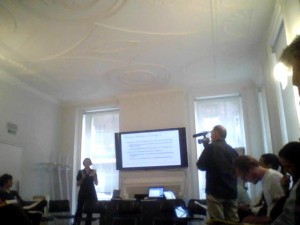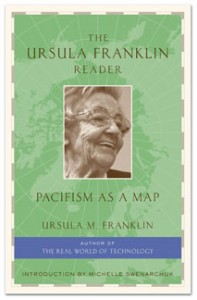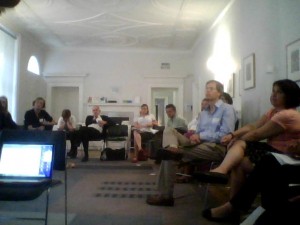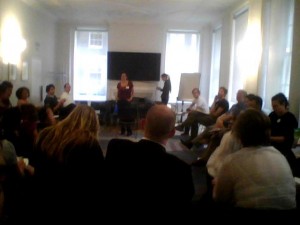After a long but productive day of workshopping and panelling, it’s time for dinner.
Jen, Jon, and Juan’s workshop
Some additional notes:
Six mindsets in engineering Positivism and the myth of objectivity Commitment to problem solving Desire to help and Persistence Centrality of Military/Corporate Organizations Narrow technical focus and lack of other skills U
ncritical Acceptance of Authority
Our group focused on Mindset 5 and 6. Some comments:
Caroline: I’m uncomfortable with the assumption with engineers only having a narrow technical
Jen: How can we help engineering faculty understand the own privilege (if they are stuck in a narrow mindset)?
Darko: My wife’s social group organises a role play/work shop called “Poverty challenge” with local … where they have to deal with social security etc.
Caroline: EWB Oz also use role-plays and we tried one in my class and I was grateful to regain my power as teacher. [So very powerful]
Ellie: Making the connections visible important. Adapt role-plays etc to persons and context. Exploring one’s own privilege is uncomfortable. Take a role easier.
Usman: If not “real”/personal then likely not really change how people think. For example, make people realise that they might be rich due to the existence of poor people.
Katy: Use a light point questionnaire (multiple choice) to let people score themselves to potentially make them see their own blind spots.
Darko and Ellie expanded on this.
Session 5 (Wednesday)
After a brief hour-long break (tea time — it is England after all!), Jon and Jen talked about designing workshops to help students push past Donna’s “mindsets that serve as barriers to justice“.
- Group 1: Heather from EWB-Queen’s (Canada) spoke about connecting educators with each other and the ESJP network. This would help interest more engineering educators in teaching about justice in their classes.
- Group 2: Use roleplaying activities to highlight privileges of class, race, etc. Students must form their own values. Educators cannot simply lecture on their own values. Student input can be encouraged through the use of roundtables, buzz groups.
- Group 3: We questioned whether assuming these mindsets would reinforce them. Use roleplaying to face barriers like the Poverty Challenge.
More on Donna and Katy’s workshop
Donna Riley and Katy Haralampides, drawing on Ursula Franklin’s ideas of scrupling encouraged, us to think of our own experiences of situations when we ourselves have been acting for (promoting) social justice and then in small group share and try to come up with examples/ways of how we can use/transfer/draw on these strategies/experiences in our ESJP work.
Juan’s group drawing on Lizzie’s experience from EWB Oz suggested that maybe trying to formulate/frame ESJP issues through formulas and models might be a way to get acceptance from other engineering faculty etc. However, if this was done then the essential human relationships fundamental for these issues would be lost, so it would be a bit pointless.
Lastly, we, in small groups, brainstormed about actions that the ESJP network can take collectively. Some suggestions were:
• Bring community members from different parts of the world together.
• Training courses in the south.
• Encourage student participation in the ESJP network.
• To share outcomes of this ESJP meeting in relevant contexts in our home countries.
• Institute ESJP awards…
• Initiate scrupling events in our own local (engineering) communities for example during wine and cheese.
• A global exercise done simultaneously in different classes and contexts.
• What does informed citizenry look like and how can engineering contribute?
• Activism at main conferences – provocative posters on SJ themes.
• ESJP ambassadors – students? – to go into classes etc.
• Pro-bono engineering, with out profit societies.
• Rip down unethical job postings?
• Database of ESJP case studies.
• Pointing to existing ESJP curricula around the globe for the benefit for educators and students at other institutions.
Session 4 (Wednesday)
I’m looking forward to Donna and Katy’s workshop. They’ve started out with talking about Ursula Franklin and scrupling (More here).
Donna and Katy asking the group to brainstorm future collective ESJP action
Candy break!
Without differentiation, we would look like this
://www.youtube.com/v/jVygqjyS4CA&hl=en_US&fs=1″ type=”application/x-shockwave-flash” allowscriptaccess=”always” allowfullscreen=”true” width=”480″ height=”385″>
Session 3 (Wednesday)
George Catalano joined us by Skype as we headed into the third session today. After some Skype issues (darn technology!), we switched to just audio and the presentation went well.
- Complex system as "integral community"
- Nonhumans and ecosystems are morally significants beings with interests and rights
- Differentiation – emergent diversification from particles to life forms leading to biodiversity
- Subjectivity – everything has a voice and an inner sense
- Community — every atom in the universe is immediately influencing every other atom in the Universe, no matter how distant
George then led us in "imagine" sessions which had us imagining what our conference would look like without differentiation, subjectivity, and community.
George Catalano is joining us on Skype.
08-04-153538″ alt=”” src=”http://esjp.org/wp-content/uploads/2010/08/2010-08-04-153538-300×225.jpg” />





